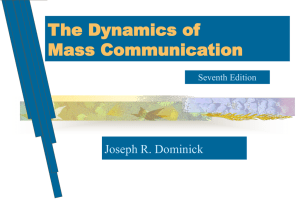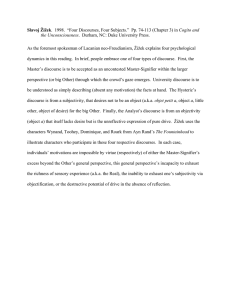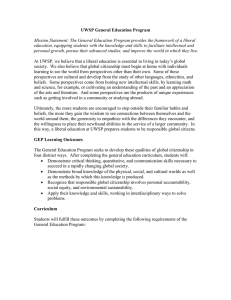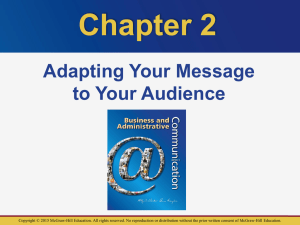Conference Paper Citizenship Education Facing Nationalism and Populism in Europe
advertisement
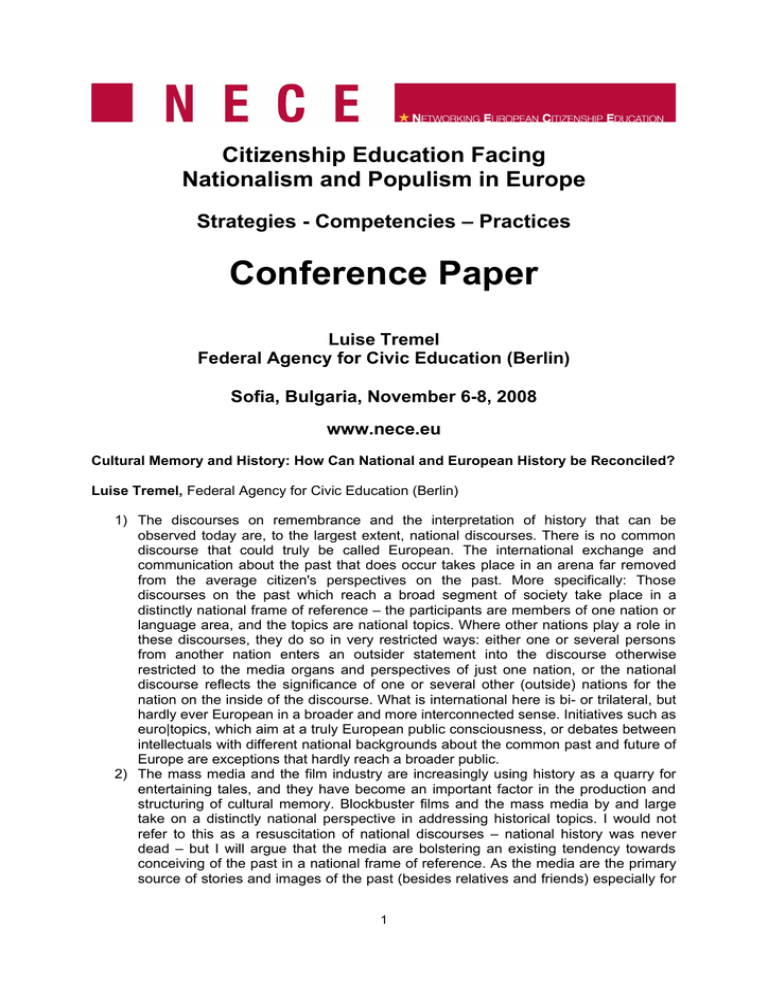
Citizenship Education Facing Nationalism and Populism in Europe Strategies - Competencies – Practices Conference Paper Luise Tremel Federal Agency for Civic Education (Berlin) Sofia, Bulgaria, November 6-8, 2008 www.nece.eu Cultural Memory and History: How Can National and European History be Reconciled? Luise Tremel, Federal Agency for Civic Education (Berlin) 1) The discourses on remembrance and the interpretation of history that can be observed today are, to the largest extent, national discourses. There is no common discourse that could truly be called European. The international exchange and communication about the past that does occur takes place in an arena far removed from the average citizen's perspectives on the past. More specifically: Those discourses on the past which reach a broad segment of society take place in a distinctly national frame of reference – the participants are members of one nation or language area, and the topics are national topics. Where other nations play a role in these discourses, they do so in very restricted ways: either one or several persons from another nation enters an outsider statement into the discourse otherwise restricted to the media organs and perspectives of just one nation, or the national discourse reflects the significance of one or several other (outside) nations for the nation on the inside of the discourse. What is international here is bi- or trilateral, but hardly ever European in a broader and more interconnected sense. Initiatives such as euro|topics, which aim at a truly European public consciousness, or debates between intellectuals with different national backgrounds about the common past and future of Europe are exceptions that hardly reach a broader public. 2) The mass media and the film industry are increasingly using history as a quarry for entertaining tales, and they have become an important factor in the production and structuring of cultural memory. Blockbuster films and the mass media by and large take on a distinctly national perspective in addressing historical topics. I would not refer to this as a resuscitation of national discourses – national history was never dead – but I will argue that the media are bolstering an existing tendency towards conceiving of the past in a national frame of reference. As the media are the primary source of stories and images of the past (besides relatives and friends) especially for 1 3) 4) 5) 6) those persons that do not regularly engage with academic accounts of historical developments, the media's national focus reinforces the national orientation of the broader public's historical consciousness. Citizenship education – alongside with cultural policy makers – is finding itself in the challenging situation that the media and family communication produce far more, far brighter and far more impressionable images and narratives of the past than lies in the capacity of educational projects and discourses. Regardless of whether the focus of citizenship education is national or European, historical education projects face the fundamental difficulty of having to compete with these more potent writers of history for whom facts and objective lines of argument are not the primary concern in relating history to their respective audiences. Historical education can fulfil a number of functions: it can initiate or intensify a person's conscious and rational engagement with history (activation); it can provide learning materials or access to knowledge that will allow a person to deepen his or her engagement with history (supply); and it can present unusual perspectives and put into question existing and widely-held public perspectives on history (problematization). The utility of choosing a national or a European frame of reference for a specific project varies with the educational goal of the project in question. A project whose primary objective is activation will likely be far better served with a national (and thus usually less complex) focus. In supplying materials, citizenship education can deliberately place European topics on the agenda, but to a large part it will need to meet demand, and demand in turn is structured by public discourse and thus likely to be nationally oriented. For those historical education projects that make it their objective to problematize existing approaches, a European perspective can be a very purposeful one. Such projects presuppose, however, that the audience's level of historical knowledge is fairly elevated and that the audience possesses at least a fundamental willingness to engage not only with questions of history but also of historiography – how am I thinking about the past, and how else could I conceive of the past? In this sense, the education projects for which a European frame of reference is most suited necessarily have an exclusive tendency. Historical education projects that attempt to address national history in a critical, nonessentialistic way and those that explicitly take on a European perspective have in common this problematic characteristic: to be successful, they require for their audiences to already be fairly educated and interested in history. These projects can thus serve only those persons that, strictly speaking, do not need historical education projects. These educated and interested persons could search for and find further information and critical perspectives elsewhere – in the media, in libraries, etc. For those audiences that are not historically educated, and who are thus the far more pertinent target group for historical education projects, critical approaches to national history and Europeanizing transnational approaches are likely to be too complex. I can imagine two quite different versions of a common European identity, one prominently featuring the past and one deriving its cohesive force from a common vision of a European future. My first scenario of a history-conscious European identity includes that national history is no longer the point of reference for a collective's shared identity. Instead, an account of a 'European' tradition would provide this identity with a sense of roots and historical continuity. Such a historically-conscious European identity would not, however, do away with the emotional baggage implied by the various European national histories. This Europeanized version of the past would instead have to reflect the shared history of conflict, of wars, of violence, of dictatorship; the experience of having endured such troubles and having emerged 2 from this past more or less together would stand at the core of this common European identity (We are one because we have gone through a lot together). My second version of a common European identity hardly gives any space to history. Instead of dwelling with a troubled past, this identity involves visions of a bright common future – something along the lines of a 'European dream'. A core of positive values and of shared prospects drives this identity that aims at a capacity to act in common, at actively crafting a shared political, economic and cultural space and at confidently interacting with the rest of the world as one unit (We are one because we will be something great together). 7) Neither of these versions of European identity is 'better', and probably a shared European identity, if it is ever to take shape, will lie somewhere between these two scenarios. What is clear, however, is that a historically-conscious common identity would present a far greater challenge to citizenship education than would a shared European vision for the future. The more 'European' the alignment of history-writing and of cultural memory, the more complicated it gets – more knowledge is needed to understand the connections, more actors come into play, more dates and more information are to be remembered. The above-described problems related to a 'problematizing' approach would apply to any educational project dealing with such a 'European' tradition. The idea that the troubled European tradition might be employed to activate a broad segment of the population to engage with political topics, and to do so enthusiastically, strikes me as illusory. 8) In spite of everything I have expressed here, my agency will address the dates of 1949 and 1989 – years highlighted initially for their significance in German history – with a decidedly international focus. The thoughts behind this are that German history of the past decades (and centuries) cannot be understood but with a European perspective; and that the world in which we and the audiences of our education measures live today is structured by so many transnational phenomena that the historical roots of this internationalized present must be made transparent and intelligible – and these roots themselves have an undeniable international dimension. In making the overall perspective an international one, I consider it crucial, however, to bear in mind that such an international focus is not suited for all audiences and not for all individual instruments of citizenship education. Formats that provide a basic introduction to important moments in German history, and that instigate enthusiasm to find out more about the recent past and maybe, in a next step, also about the international dimension of these past occurrences, will stand side by side with projects that problematize, for instance, the nationalizing and simplifying tendencies of media accounts of history. One project that will attempt to unite all the different goals and foci I have named – activation, supply with information, problematization; German history, a common European experience of conflict, and visions for a shared European future – is a four-day history festival to take place in Berlin at the end of May 2009, titled “History Forum 1989|2009: Europe between Division and New Beginnings”. The hope driving this quite ambitious project is that different audiences, if brought together in one central festival, will not only learn from the various education formats that the respective groups consider interesting and relevant, but that they will also learn from each other, from being confronted with each other's approaches to history and each other's perspectives of choice. 3

